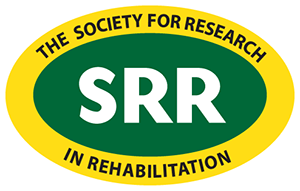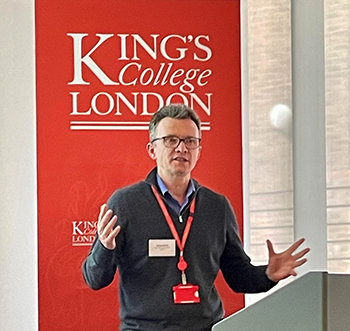Rehabilitation in life-limiting conditions: Supporting people to live well

The Society for Research in Rehabilitation (SRR) Winter Conference was held on the 29 April 2024 at the Cicely Saunders Institute, King’s College London and focused on ‘Rehabilitation in life-limiting conditions: Supporting people to live well’ including those with neurological conditions. It was run in partnership with the South London NIHR-ARC and Cicely Saunders International.
The Society for Research in Rehabilitation is a multi-disciplinary group whose members share the principal goal of carrying out and promoting high quality research to develop effective, relevant and forward-thinking rehabilitation practices that will improve the opportunities available to people with acute and chronic disabling conditions.
SRR provides a forum for high quality rehabilitation research:
- Raising the profile of rehabilitation research
- Encouraging the evaluation of rehabilitation practice through well-designed studies
- Fostering a climate in which people can develop and share research skills
- Enabling active researchers to share the results of their research
- Advancing rehabilitation practice for acute and chronic disabling conditions
- Training enabling junior researchers to present research in a supportive and collaborative environment
The focus of the meeting was to consider rehabilitation research through a focus on conditions which are either life-limiting or have implications for ongoing disability management which may need life-long rehabilitation intervention. As is usual at SRR meetings, there was a mixture of peer-reviewed ‘free-paper’ submissions (both oral and posters with short oral ‘quick-fire’ presentation) and invited symposium speakers.
A welcome to the conference was given by Professor Richard Harding and was followed by a symposium on ‘Rehabilitation in frailty and palliative care’. Professor Matthew Maddocks and Dr Lisa Brighton presented on frailty-attuned’ rehabilitation services for people with chronic respiratory disease and what matters to people within palliative rehabilitation. They proposed that much of the effort towards the ‘healthy ageing’ agenda is focused on preventing conditions from occurring and maintain a state of high capacity. Yet even with some success, the fact remains that a large and growing number of people are living with, and dying from, advanced disease and face distressing symptoms, disability and dependence on others, and related suffering around the loss of roles, self-identity and purpose. Key recommendations from findings so far are; Rehabilitation is a key component of high quality oncology, geriatric and palliative care. Screening and triage processes, and goal-driven care offer useful starting points for service development. Successful models that ‘focus on function’ can help teams deliver integrated care. Research opportunities at the interface between rehabilitation and palliative care are exciting and vast.
To address this major societal challenge will require research which integrates rehabilitation into care (including palliative, end of life care and ongoing care in neurological practice). Research will feed into practice which exemplifies interdisciplinary and collaborative working and considers the person in the context of their environment to achieve optimal function and quality of life.

Associate Professor Stephen Ashford then discussed current work on the need and application of physical and postural management for people with prolonged disorders of consciousness (PDOC) after acquired brain injury. In discussing this important issue for management, research was presented emphasising the changes that can be made to the ongoing care regime which prevent and limit further physical deterioration for those continuing in a PDOC state (Ashford et al 2022).
From a recent study, also presented, it was identified that of the approximately 365 patients admitted to specialist rehabilitation units per year in the UK, in a PDOC state, 43% emerge into consciousness leaving about 150 patients per year in PDOC states that are likely to be permanent and require ongoing physical management. Identifying those who emerge and providing timely rehabilitation generates cost-savings that pay for the entire PDOC evaluation/rehabilitation programme many times over (Turner-Stokes et al 2023).
In the second symposium the management of breathlessness in respiratory disease was addressed, with a focus on improving activity and quality of life. Dr Charles Reilly presented work on the Self-Breath project for chronic breathlessness in advanced disease and Dr Sabrina Bajwah presented on breathlessness management in interstitial lung disease. The work on Self-Breath emphasises the benefits and effectiveness of non-pharmacological self-management interventions for chronic breathlessness in advanced respiratory disease, with a further trial currently ongoing. Dr Bajwah summarised the context, research evidence and interventions available for breathlessness management and areas for ongoing research exploration.
Oral peer-reviewed presentations were given on: Embodied-cognition intervention for numerical deficits (acalculia) after a stroke/ brain-injury (Yael Benn), The impact of delays in transfer to specialist rehabilitation on outcomes in patients with acquired brain injury (Lloyd Bradley), Employers’ needs when supporting stroke survivors returning to work: a mixed-methods study (Kristelle Craven), Optimising independence and quality of life in palliative care: A consensus study adapting the Action Falls Multifactorial Falls Prevention Programme for hospices (Frances Allen), Improving clinician’s treatment specification through adoption of the Rehabilitation Treatment Specification System (RTSS) (Jamie Gibson), Effectiveness of conservative non-pharmacological interventions in people with muscular dystrophies: a systematic review and meta-analysis (Enza Leone), Vestibular disorders give rise to communication difficulties in adults: results of a UK wide survey (Sylvia Taylor-Goh).
The next SRR conference will be advertised on the SRR website
